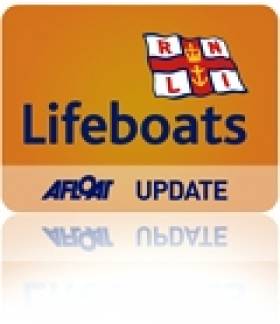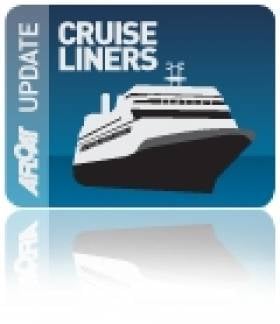Displaying items by tag: Isle of Man
Two Vessels Collide off Isle of Man
At 0600 this morning the 17-metre fishing boat 'Lynn Marie' called Liverpool Coastguard to report a collision between their vessel and the 155 metre coaster 'MV Philip'. Although there was minimal damage to the coaster, the fishing vessel suffered extensive damage to her port side bow and began taking on water. Liverpool Coastguard requested the launch of the Port St Mary RNLI Lifeboat, and other vessels in the area including the HM Customs Cutter 'Sentinel'.
Crew from the Port St Mary Lifeboat boarded the fishing vessel with their pump, along with a pump from the Sentinel, to try and stop it from taking on water. The Port Erin RNLI Lifeboat was also launched to provide an extra pump. The Port St Mary Lifeboat then towed the fishing vessel stern first (due to the damage) into the harbour at Port St Mary.
Liverpool Coastguard Watch Manager Su Daintith said:
"The fishing vessel Lynn Marie arrived alongside at Port St Mary at 0941 with the intention to tow her into the inner harbour at high water. The coaster MV Philip proceeded on to its original destination of Greenock.
We have informed the Marine Accident Investigation Branch of this incident."
Proposed Irish Sea Conservation Zones
The area include the inshore waters of Merseyside, Lancashire and Cumbria and offshore waters of the Isle of Man, Wales, Northern Ireland and England. One of the zones is a 187 square km stretch of deep water between Northern Ireland and the Isle of Man.
In order to gain a greater understanding of the proposed zones, the report commissioned a Regional Stakeholder Group which drew from a diverse range of interests in the Irish Sea. Among the stakeholders included were the Royal Yachting Association, the fishing community and ports authorities. The review identified the size, shape and locations of the proposed 10 ten new Marine Conservation Zones. For the first time, the zones included inshore water of the Irish Sea project area as well as offshore.
"This is a real milestone for the project, with potential Marine Conservation Zones identified in both inshore and offshore waters", said Greg Whitfield, project manager at Irish Sea Conservation Zones.
"It is now really important that people take a look at the potential zones and give us their feedback on them. The better the information we have, the better the Marine Conservation Zones that are recommended by the regional stakeholder group will be."
Each of the marine conservation zones are designed to protect nationally important marine wildlife, habitats and geology. In addition they are designed to have the least impact possible on people's activities, but some restrictions will apply as the zones must meet guidelines for protecting species and habitats.
Members of the public are being invited to participate and will be considered as the second project continues to refine its proposals. The report is only a snapshot of the work so far. It does not contain concrete recommendations for the locations of Marine Conservation Zones (MCZ) in the Irish Sea, and the potential zones shown in the report are described as tentative and liable to change.
The Irish Sea Conservation Zone project will be releasing a third report before the Regional Stakeholder Group finalises its recommendations. The reports are delivered to the Science Advisory Panel. The independent body is comprised of expert scientists whose main role is to evaluate the potential of MCZs against ecological criteria.
The third progress report will be made available in February 2011. Its final recommendations will then be presented to the UK government in June. Following that a formal public consultation on the proposed MCZs are to take place in late 2011 and early 2012.
For information on the Second Progress Report including feedback forms can be downloaded from HERE or by calling 00 44 (0)1925 813 200
Irish Sea Scallop Ban Raises Ire of Scots
Scottish fishermen have taken exception to a new ban on fishing for scallops in the Irish Sea around the Isle of Man.
Authorities on the island introduced the bylaw in reaction to what they perceive as dangerous levels of overfishing and are "keen to conserve and protect its scallop beds", according to The Guardian.
It has been claimed that so many undersized juveniles are fished by trawlers in the two-week season each November "that the population is being put at risk".
However, Scottish fisheries minister Richard Lochhead was quoted as describing the new measure as "unnecessary and unwarranted" and a "war" against Scots.
"There's been no scientific case to back up the bylaw that's been put in place, which blatantly just excludes Scottish vessels," he said.
Irish Sea to Get More Super Yachts
The Irish Sea and possibly the Irish East Coast may see more super yacht traffic thanks to an Isle of Man Government initiative aimed at registering more Super yachts on the island after the Monaco Yacht Show later this month. Four government representatives are travelling to the famous tax haven in the hope of attracting more business.
The island's super-yacht industry has grown by 20% in the past year and there are currently 95 commercial yachts registered with the Manx flag.
The Isle of Man government is confident business will increase as a result of having a presence in Monaco.
Director of the Isle of Man Ship Registry Dick Welsh told the BBC: "It is difficult to quantify how much the industry is worth to the Isle of Man.
"The registration charge is £700 but then there is the technical management, crew management, chartering and insurance.
"It's a thriving industry which employs around 100 people on the Island."
More from the BBC HERE.































































